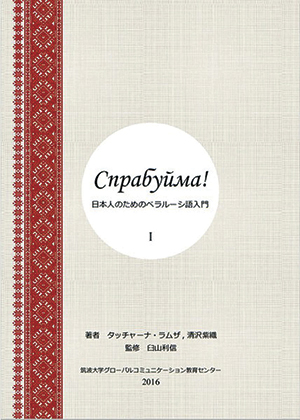An unusual textbook has recently been published in Japan: Try! Educational-Elementary Course of Belarusian Language for Japanese. Written by Siora Kiosava — a young Japanese researcher of Belarusian language, and Tatiana Ramza — an associate professor at the Belarusian State University, the edition has been edited by Professor Toshinobu Usuyama, of Tsukuba University.

Siora Kiosava is a young Japanese researcher of Belarusian language
Japanese Ms. Kiosava speaks Belarusian better than most ‘natives’, and knows the languages of our neighbours: Russian, Polish and Ukrainian. She has established a club in Japan to teach Belarusian and plans to compile a Japanese-Belarusian phrasebook.
The Belarusian-Japanese textbook is unique in being the first practical aid for Japanese speakers. Moreover, Ms. Kiosava hopes it will help Japan to find new Belarusian friends. “I hope this first attempt to study Belarusian by each interested Japanese reader will transform into deep interest for Belarusian history and culture,” she says. Having studied Belarusian for over three years, she comments, “I studied with a teacher for a year and then continued on my own.”
Why do you study Belarusian?
This is a good question. At present, few Slavicists in Japan know Belarusian. With this in mind, I consider that my country needs at least one specialist in your country’s language. I came across the Belarusian language accidentally. While reading a book, I discovered that almost no city residents speak Belarusian. My scientific supervisor advised me to describe this situation in my Master’s degree paper. Moreover, Tsukuba University signed an agreement with the Belarusian State University and I came to Minsk for an internship. I began studying Belarusian more thoroughly — alongside the language situation in your country.
What do Japanese people know of Belarus?
Sadly, some Japanese know nothing of this country. However, after the Fukushima disaster, in 2011, some became interested in our history of similar catastrophes. Much was spoken of the Chernobyl tragedy, and how it affected Belarus. I’d like Belarus to be associated not only with this recent problem but to be known for its rich culture, which can hardly be studied without knowledge of the language.
Ms. Kiosava says that it’s a challenge for Japanese to learn not only Belarusian but any Indo-European language, “The Japanese language strongly differs from Indo-European languages. Initially, all Slavonic languages look identical to us and their differences appear only over time. I can now see the difference between Russian and Belarusian, and I respect their common features.
 |  |
Where do you have the opportunity to speak Belarusian in Minsk?
Belarusian language assistants work at a bookstore, so I discuss books with them with pleasure.
Do you plan to translate any editions?
There’s a great need for this. In the past, all Belarusian writers were translated into Japanese through Russian. An author called Go Kashina, in my country, has translated Belarusian language Rygor Borodulin, Vladimir Korotkevich and Andrey Fedorenko into Japanese. She also studies your literature.
Who is your favourite writer?
Vasil Bykov.
At first sight, Belarusian people and Japanese citizens differ greatly. Are there any common features between our nations?
Belarusians resemble Japanese in being similarly modest.
Yosuke Kashiwagi is another Japanese citizen interested in Belarus. He lives in Tokyo and has only visited Belarus once, in passing. However, this was enough for him to fall in love with our country. “I was born in Tokyo, grew up there and live there today. I studied at Waseda University and am now investigating Soviet history. As part of my work, I’ve become acquainted with Belarus’ past, which has captured my imagination,” he explains. “The Belarusian language is charming and beautiful, melodic and soft.”
Japanese citizens respect Belarusians’ desire to preserve their language. As Mr. Kashiwagi says, every Japanese person abroad does their best to ensure that their children know their native language. “Probably, this is why we’ve endured as a nation. I want Belarusians to respect their history and heritage. We — Japanese — will help you spread knowledge of Belarus all over the globe,” he adds.
By the way
 Belarusian Iosif Goshkevich — who was born in Rechitsa District — became a Japanese language expert in the 19th century. As a translator, he accompanied a Russian diplomatic mission to Japan and, with his help, the Russian-Japanese Treaty of 1855 was signed. Jointly with Japanese monk Tachibana Kosai, he compiled 450 pages of the first Japanese-Russian dictionary. From 1858-1865, Iosif worked as the first Russian consul to Japan, being among those foreigners allowed to the shogun (owner) court in Japan’s Eda (now known as Tokyo). In 1899, Iosif’s Roots of Japanese Language was published in Vilno. A monument to him was erected in Hakodate.
Belarusian Iosif Goshkevich — who was born in Rechitsa District — became a Japanese language expert in the 19th century. As a translator, he accompanied a Russian diplomatic mission to Japan and, with his help, the Russian-Japanese Treaty of 1855 was signed. Jointly with Japanese monk Tachibana Kosai, he compiled 450 pages of the first Japanese-Russian dictionary. From 1858-1865, Iosif worked as the first Russian consul to Japan, being among those foreigners allowed to the shogun (owner) court in Japan’s Eda (now known as Tokyo). In 1899, Iosif’s Roots of Japanese Language was published in Vilno. A monument to him was erected in Hakodate.By Viktar Korbut











